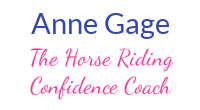Have been told that if you dismount when your horse “acts up”, your horse has "won" and you've taught him how to get you off his back?
I disagree with this thinking and encourage riders to dismount whenever they choose. After all, it's your butt in the saddle!
The Fear Threshold
Everyone has a threshold for where their fear becomes overwhelming. Horses and humans both have this fear threshold. And, it's different for every individual.
For some people, just the thought of the horse possibly “acting up” can trigger fear and even put them over the threshold.
For others, it might not happen until after their horse has bucked, reared or spooked. The critical factor in the situation is your fear and your ability to manage it.
Your Lizard Brain Runs The Show
Fear is controlled by a primitive part of our brains called the Amygdala. It is sometimes referred to as “the lizard brain”.
Its programming takes over your logical mind as well as your body.
You lose the ability to think rationally, your body stiffens, your heart rate increases and you either hold your breath or breathe very rapidly.
As the fear increases, you may feel other symptoms such as being light headed, nausea, tunnel vision, shaking, sweating or clammy skin.
Your horse of course senses and responds to all of these changes and becomes more anxious as well. This is where things can go from bad to worse if you stay in the saddle.
And that's when it's not only okay to dismount, but it's actually best that you do.
You might ride through the issue, but neither you nor your horse will have enjoyed the experience. Chances are greater that it will be a negative training experience for you both.
And that negative experience proves to your brain that you shouldn't really be doing this crazy horse riding lark!
However, if you dismount when you recognize the first signs of fear, when your quiet inner voice tells you to get off, or you know that you don't have the riding skills to deal with the situation, you can create a win-win training opportunity by working through the situation from the ground.
Groundwork Builds Positive Experiences For You And Your Horse
Groundwork, done correctly, is a great way for both you and your horse to regain your composure, focus and work through the fearful situation.
By using training building blocks, you and your horse can take one step at a time at your own pace to gain trust and confidence in yourselves and in each other.
When you're ready, you'll continue these exercises when you get back in the saddle. But, it doesn’t necessarily have to happen in the same session.
Practice Mounting And Dismounting
If your horse is fine but you are a bundle of nerves, you can practice mounting and dismounting over and over.
That will certainly get your horse used to the idea that he should not walk off as soon as you are in the saddle and dismounting does not mean you are finished.
The next step - when you're ready - is to exhale deeply and ask your horse to walk a few steps – as far as you are comfortable going – before you halt and dismount.
Gradually, extend the length of time you stay in the saddle and/or the area of the trail or arena you go to.
You might choose to do some groundwork before remounting. Your horse has no idea what your plan is so you can change your mind about what you're doing at any time.
As you feel more comfortable and confident, you can ask more of yourself and your horse – gradually extending the envelope of your comfort zone.
Yes, you will still feel a bit nervous. But you won't be going over your fear threshold. You will still be thinking clearly and able to release any tension in your body.
Let Go Of Deadlines And Expectations
Take the pressure off yourself and your horse by eliminating deadlines and expectations.
You're on a journey which will have highs and lows. It's not a straight line. There will be good days and bad days.
Sometimes you'll retrace steps you have already taken and sometimes you will leap forward.
Confidence comes from having a good foundation built from solid building blocks, having trust in yourself and your horse, and being supported by someone who encourages you while also allowing you to grow at the time and pace that are best for you.
Struggling with your confidence or your partnership with your horse?
Book a free assessment call and we can talk about the best ways to help you fix that problem.

